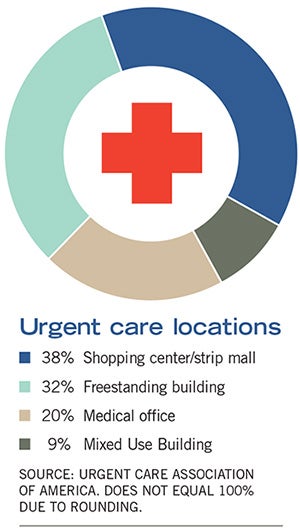Urgent care clinics grow in response to consumer demand
 To satisfy the growing number of consumers who want their health care delivered the same way as their food — convenient, fast and affordable — the number of urgent care centers continues to grow across the United States.
To satisfy the growing number of consumers who want their health care delivered the same way as their food — convenient, fast and affordable — the number of urgent care centers continues to grow across the United States.
With approximately 60 million individuals in the United States who lack access to primary care, urgent care clinics are becoming an attractive option, according to a report by investment banking service firm Harris Williams & Co.
The Urgent Care Association of America (UCAOA) states that there are an estimated 6,400 verifiable urgent care centers in the nation, while the American Academy of Urgent Care Medicine puts the number at an estimated 9,300, and other organizations put the total at up to 10,000.
Regardless of the number, urgent care is a growth industry. Harris Williams & Co. predicts the $14.5 billion urgent care industry will increase 5.8 percent annually through 2018 to about $18.8 billion.
According to a 2014 survey by UCAOA, clinic owners include:
• 33 percent corporations;
• 20 percent joint ventures;
• 14 percent physician groups;
• 13 percent hospitals;
• 12.5 percent single physicians;
• 5 percent nonphysicians.
While urgent care has existed for decades, some health care systems have decided to get in the game or expand their presence, recognizing an opportunity to bring health care to their communities and extend their brands.
“Urgent care centers bring many benefits to hospitals and health systems,” says Alan A. Ayers, UCAOA board member. “Urgent care can help alleviate emergency department overcrowding, particularly when overwhelmed by patients with low-acuity conditions who have no other on-demand medical option.”
Ayers acknowledges that there is a marketing benefit for health care systems as patients are referred for diagnosis or follow-up care, making urgent care a possible “front door” to the health system, he says.
North Shore-LIJ Health System, Long Island, N.Y., partnered with Access Clinical Partners, an urgent care operator backed by private equity investment firm TPG Capital, as reported by Hospitals & Health Networks magazine. Under the North Shore-LIJ GoHealth brand name, they plan to open about 80 clinics in the Long Island area in the next five years.
Intermountain Healthcare, Salt Lake City, which has operated urgent care clinics since the 1980s, has tripled the number to 30 in the past decade. It plans to open more clinics on its medical center campuses throughout Utah.
Going forward, more hospitals may want to consider investing in urgent care clinics whether they go it alone or in a partnership, according to Merchant Medicine, a Minneapolis-area consulting and research firm specializing in walk-in care.
In a recent consumer survey, Merchant Medicine found that 70 percent prefer going to an urgent care clinic affiliated with a hospital compared with just 16 percent who prefer independent clinics.




